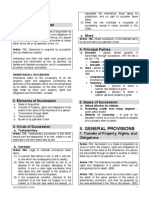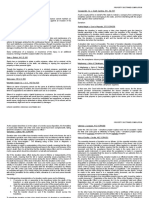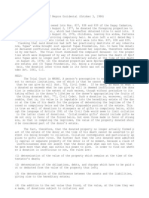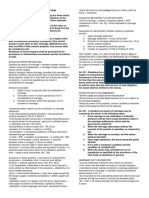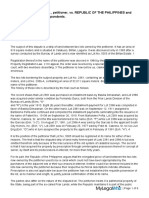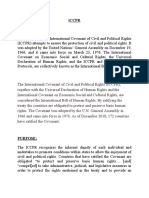0 ratings0% found this document useful (0 votes)
73 viewsDonations Cases
Donations Cases
Uploaded by
juna1. The document discusses several cases related to donations. In Republic vs Guzman, the court found there was no valid donation of an immovable property because not all essential elements were present, including intent to do an act of liberality.
2. In Quijada v. Court of Appeals, the court ruled that ownership was transferred to the donee subject to the condition of constructing a school, and failure to meet that condition would revert ownership back to the donor.
3. In Calanasan vs. Spouses Virgilio Dolorito and Evelyn c. Dolorito, the court agreed with the appellate court that the donation was onerous in nature since it imposed a burden on the done
Copyright:
© All Rights Reserved
Available Formats
Download as PDF, TXT or read online from Scribd
Donations Cases
Donations Cases
Uploaded by
juna0 ratings0% found this document useful (0 votes)
73 views3 pages1. The document discusses several cases related to donations. In Republic vs Guzman, the court found there was no valid donation of an immovable property because not all essential elements were present, including intent to do an act of liberality.
2. In Quijada v. Court of Appeals, the court ruled that ownership was transferred to the donee subject to the condition of constructing a school, and failure to meet that condition would revert ownership back to the donor.
3. In Calanasan vs. Spouses Virgilio Dolorito and Evelyn c. Dolorito, the court agreed with the appellate court that the donation was onerous in nature since it imposed a burden on the done
Original Title
DONATIONS CASES
Copyright
© © All Rights Reserved
Available Formats
PDF, TXT or read online from Scribd
Share this document
Did you find this document useful?
Is this content inappropriate?
1. The document discusses several cases related to donations. In Republic vs Guzman, the court found there was no valid donation of an immovable property because not all essential elements were present, including intent to do an act of liberality.
2. In Quijada v. Court of Appeals, the court ruled that ownership was transferred to the donee subject to the condition of constructing a school, and failure to meet that condition would revert ownership back to the donor.
3. In Calanasan vs. Spouses Virgilio Dolorito and Evelyn c. Dolorito, the court agreed with the appellate court that the donation was onerous in nature since it imposed a burden on the done
Copyright:
© All Rights Reserved
Available Formats
Download as PDF, TXT or read online from Scribd
Download as pdf or txt
0 ratings0% found this document useful (0 votes)
73 views3 pagesDonations Cases
Donations Cases
Uploaded by
juna1. The document discusses several cases related to donations. In Republic vs Guzman, the court found there was no valid donation of an immovable property because not all essential elements were present, including intent to do an act of liberality.
2. In Quijada v. Court of Appeals, the court ruled that ownership was transferred to the donee subject to the condition of constructing a school, and failure to meet that condition would revert ownership back to the donor.
3. In Calanasan vs. Spouses Virgilio Dolorito and Evelyn c. Dolorito, the court agreed with the appellate court that the donation was onerous in nature since it imposed a burden on the done
Copyright:
© All Rights Reserved
Available Formats
Download as PDF, TXT or read online from Scribd
Download as pdf or txt
You are on page 1of 3
DONATIONS CASES Castillo vs Castillo
FACTS: A donation of land was given so that the donee would
defray the cost of the donor's subsistence and future burial and "if
Republic vs Guzman
perchance anything should remain from the price of the land, the
Ruling: No, there was no donation inter vivos. surplus of the said expenses is granted to him by me": What kind
of a donation is this from the viewpoint of cause?
Not all the elements of a donation of an immovable property HELD: This is a remuneratory or compensatory donation (of the
are present in this case. There are three (3) essential elements of a second kind) insofar as the burden (which is inferior to the value of
donation: the land) is concerned.
1. The reduction of the patrimony of the donor;
Quijada v. Court of Appeals, 229 SCRA 695
2. The increase in the patrimony of the donee;
Ruling: When the donation was accepted, the ownership was
3. The intent to do an act of liberality or animus donandi. transferred to the school, only subject to a condition that a school
(missing element) must be constructed over the lot. Since ownership was transferred,
Likewise, the deeds of quitclaim executed by Helen may have and failure to fulfill the condition reverts the ownership back to the
been in the nature of a public document but lacks the essential donor.
element of acceptance in the proper form required by law to be a
valid donation. The acceptance must be in the same deed of
donation, or in a separate public document where the donor must
be notified in an authentic form to be noted in both instruments.
Laureta v. Mata, 44 Phil. 668 now applies to donations between persons living together as
husband and wife without a valid marriage, for otherwise, the
Ruling: A donation is perfected as soon as the donor has knowledge
condition of those who incurred guilt would turn out to be better
that it has been accepted by the donee.
than those in legal union.
It appears from the instrument itself that Ester Magno accepted
Heirs of Salud Dizon Salamat vs. Tamayo (298 SCRA 313
the donation on behalf of the son, and the acceptance is
(1998)
incorporated in the body of the instrument and made a part of it,
and is signed by the donor and acceptor in the presence of Ruling: No, the donation to Natividad is not valid.
witnesses and the instrument as a whole is legally acknowledge
Art. 749 of the Civil Code provides “In order that the
before a notary public.
donation of an immovable may be valid, it must be made in a public
Araneta v. Perez L-18872, July 15, 1966 document, specifying therein the property donated and the value
of the charges which the done must satisfy.”
Held: Yes, for Art. 736 which states that “guardians and trustees
cannot donate the property entrusted to them” applies only to “It is clear from Article 749 that a transfer of real property from one
simple donations or gifts of pure benefi cence. In the instant case, person to another cannot take effect as a donation unless
the donation was made precisely in the interest of the estate trust embodied in a public document.”
or the trust beneficiaries.
The alleged donation was done orally and not executed in a
Agapay v. Palang 85 SCAD 145 (1997) public document. Moreover, the document which was presented
by respondent in support of her claim that her father donated the
Held: The transaction was properly a donation made by Miguel to
subject parcel of land to her was a mere private document of
Erlinda, but one which was clearly void and inexistent by Art. 739
conformity which was executed by her elder brother, Eduardo in
express provision of law because it was between persons guilty of
1956. It should be pointed out that the brothers Eduardo and
adultery or concubinage at the time of the donation, under Art. 737
Gaudencio had already ceded their herediatary interests to
of the Civil Code. Moreover, Art. 87 of the Family Code expressly
petitioner Salud Dizon Salamat even before 1950.
provides that the prohibition against donations between spouses
Calanasan vs. Spouses Virgilio Dolorito and Evelyn c.
Dolorito
Ruling: The petitioner may not dissolve the donation.
Article 733. Donations with an onerous cause shall be
governed by the rules on contracts, and remuneratory donations
by the provisions of the present Title as regards that portion which
exceeds the value of the burden imposed."
The SC agree with the CA that since the donation imposed on
the donee the burden of redeeming the property for P15,000.00,
the donation was onerous. As an endowment for a valuable
consideration, it partakes of the nature of an ordinary contract;
hence, the rules of contract will govern and Article 765 of the NCC
finds no application with respect to the onerous portion of the
donation.
Insofar as the value of the land exceeds the redemption price
paid for by the donee, a donation exists, and the legal provisions
on donation apply. Nevertheless, despite the applicability of the
provisions on donation to the gratuitous portion, the petitioner
may not dissolve the donation. She has no factual and legal basis
for its revocation, as aptly established by the RTC. First, the
ungrateful acts were committed not by the donee; it was her
husband who committed them. Second, the ungrateful acts were
perpetrated not against the donor; it was the petitioner's sister
who received the alleged ill treatments. These twin considerations
place the case out of the purview of Article 765 of the New Civil
Code.
You might also like
- Uk Theatre Equity Theatre Directors AgreementDocument13 pagesUk Theatre Equity Theatre Directors AgreementWilliam ByramNo ratings yet
- Succession ReviewerDocument96 pagesSuccession ReviewerAylwin John Perez80% (5)
- Wills Succession Atty. Sebastian Lecture NotesDocument71 pagesWills Succession Atty. Sebastian Lecture Notesroa yusonNo ratings yet
- Lagazo Vs CA Case Prop DigestDocument4 pagesLagazo Vs CA Case Prop Digestclaudenson18No ratings yet
- 2 Semester, SY 2013-2014: UNO-R College of Law TAX II Case DigestDocument2 pages2 Semester, SY 2013-2014: UNO-R College of Law TAX II Case DigestGlenda MayNo ratings yet
- Alejandro v. Geraldez DigestDocument2 pagesAlejandro v. Geraldez DigestJM Camalon100% (1)
- Art. 82 96 Case DigestsDocument12 pagesArt. 82 96 Case DigestsJac LedonioNo ratings yet
- De Roma vs. Court of Appeals (Digest)Document2 pagesDe Roma vs. Court of Appeals (Digest)Alegria IrisNo ratings yet
- Cases 10 - Donations and PrescriptionDocument27 pagesCases 10 - Donations and PrescriptionKersy Mere FajardoNo ratings yet
- Donations Propter NuptiasDocument3 pagesDonations Propter NuptiasBingkat MacarimbangNo ratings yet
- CompilationDocument13 pagesCompilationChris CoNo ratings yet
- Ganuelas v. CawedDocument4 pagesGanuelas v. CawedHanna AlfantaNo ratings yet
- CALANASAN Vs DOloRITODocument9 pagesCALANASAN Vs DOloRITOLarssen IbarraNo ratings yet
- 2.7. SANTOS V ROBLEDO - DigestDocument1 page2.7. SANTOS V ROBLEDO - DigestKate GaroNo ratings yet
- De Roma Vs CADocument2 pagesDe Roma Vs CAnathNo ratings yet
- De Roma v. CADocument1 pageDe Roma v. CAJane Garcia-Comilang100% (1)
- Villanueva VS BrancoDocument14 pagesVillanueva VS BrancoViolet BlueNo ratings yet
- PROPERTY Calanasan v. Spouses DoloritoDocument1 pagePROPERTY Calanasan v. Spouses DoloritoDianne Bernadeth Cos-agonNo ratings yet
- Cases On DonationDocument10 pagesCases On DonationAaron DoguilesNo ratings yet
- Succession ReviewerDocument72 pagesSuccession ReviewerChevien Dioneza Davila100% (5)
- CJ Yulo vs. Roman Catholic DonationDocument2 pagesCJ Yulo vs. Roman Catholic DonationheyoooNo ratings yet
- Succession ReviewerDocument41 pagesSuccession Reviewersheena_cureg100% (1)
- Assignment 21 FsDocument8 pagesAssignment 21 FsfaarehaNo ratings yet
- Property - WK 13 NotesDocument10 pagesProperty - WK 13 NotesYnna MendozaNo ratings yet
- First Set of CasesDocument33 pagesFirst Set of CasesElreen Pearl AgustinNo ratings yet
- Business Org. 24.docx TrustDocument5 pagesBusiness Org. 24.docx TrustDennis DagoocNo ratings yet
- Immovable Property I: Sale of Land Under Customary LawDocument72 pagesImmovable Property I: Sale of Land Under Customary LawMaame Baidoo100% (1)
- Villanueva v. Sps. BranocoDocument14 pagesVillanueva v. Sps. Branocobrida athenaNo ratings yet
- G.R. No. 82027. March 29, 1990. Romarico G. Vitug, Petitioner, vs. The Honorable Court of Appeals and Rowena FAUSTINO-CORONA, RespondentsDocument9 pagesG.R. No. 82027. March 29, 1990. Romarico G. Vitug, Petitioner, vs. The Honorable Court of Appeals and Rowena FAUSTINO-CORONA, RespondentsKrisha FayeNo ratings yet
- CALANASAN V DOLORITODocument2 pagesCALANASAN V DOLORITOShana100% (1)
- Sux Prelim-CasesDocument44 pagesSux Prelim-CasesBelle MaturanNo ratings yet
- Alejandro Vs Geraldez DigestDocument3 pagesAlejandro Vs Geraldez DigestSanjay Figueroa100% (1)
- Cases Collation StudentsDocument11 pagesCases Collation Studentsliboanino100% (2)
- Toaz - Info Trust Digest PRDocument7 pagesToaz - Info Trust Digest PRJevi Ruiiz100% (1)
- Real Property Covering Seven Parcels of Land in Favor of Her Niece Ursulina Ganuelas (Ursulina)Document4 pagesReal Property Covering Seven Parcels of Land in Favor of Her Niece Ursulina Ganuelas (Ursulina)Charmila SiplonNo ratings yet
- Guide Notes On Donor'S Tax Donor'S TaxDocument10 pagesGuide Notes On Donor'S Tax Donor'S TaxMarisse CastañoNo ratings yet
- Petitioner vs. vs. Respondents: First DivisionDocument4 pagesPetitioner vs. vs. Respondents: First DivisionCathy BelgiraNo ratings yet
- Case Doctrines On SuccessionDocument14 pagesCase Doctrines On SuccessionGabrielle De VotaNo ratings yet
- Donations by Reason of MarriageDocument2 pagesDonations by Reason of MarriageKayeCie RL100% (1)
- Donation Propter NuptiasDocument6 pagesDonation Propter NuptiasajdgafjsdgaNo ratings yet
- Vda. de Tupas vs. RTC G.R. L-65800 On CollationDocument6 pagesVda. de Tupas vs. RTC G.R. L-65800 On CollationVenus Amelie MejiaNo ratings yet
- (Obli) Hemedes v. CADocument3 pages(Obli) Hemedes v. CAMonicaSumangaNo ratings yet
- Donation Case DigestDocument22 pagesDonation Case DigestRUBY JAN CASASNo ratings yet
- Rule 88 Case Digest #2 Santos vs. Manarang Facts: Don Lucas de Ocampo Died On November 18, 1906Document1 pageRule 88 Case Digest #2 Santos vs. Manarang Facts: Don Lucas de Ocampo Died On November 18, 1906Diane Dee YaneeNo ratings yet
- Succession I. General Provisions (774-782)Document61 pagesSuccession I. General Provisions (774-782)Joseph ValenciaNo ratings yet
- Tax 2 CompiledDocument34 pagesTax 2 CompiledHannah Abigail GruyalNo ratings yet
- Succession Reviewer PDFDocument61 pagesSuccession Reviewer PDFButch MaatNo ratings yet
- Civil Code - PropertyDocument7 pagesCivil Code - PropertyFlordeliz Florida LaputNo ratings yet
- Tax Case Digest - 7.6.12Document3 pagesTax Case Digest - 7.6.12nicktortsNo ratings yet
- Quilala V AlcantaraDocument11 pagesQuilala V AlcantaraShane FulguerasNo ratings yet
- Advancement Gifts Inter Vivos EquityDocument12 pagesAdvancement Gifts Inter Vivos Equitysamurai.stewart.hamiltonNo ratings yet
- Smith BellDocument71 pagesSmith BellRegina AsejoNo ratings yet
- PHILAW Case #1Document6 pagesPHILAW Case #1Kimberly DioNo ratings yet
- De Los Santos vs. de La Cruz (Beltran & Mauna)Document2 pagesDe Los Santos vs. de La Cruz (Beltran & Mauna)Arvin Glen BeltranNo ratings yet
- 11 de Roma v. CA. 2Document2 pages11 de Roma v. CA. 2Eddie MagalingNo ratings yet
- Law School Survival Guide (Volume I of II) - Outlines and Case Summaries for Torts, Civil Procedure, Property, Contracts & Sales: Law School Survival GuidesFrom EverandLaw School Survival Guide (Volume I of II) - Outlines and Case Summaries for Torts, Civil Procedure, Property, Contracts & Sales: Law School Survival GuidesNo ratings yet
- History of Inheritance Law: Everything You Need to KnowFrom EverandHistory of Inheritance Law: Everything You Need to KnowNo ratings yet
- Cape Law: Texts and Cases - Contract Law, Tort Law, and Real PropertyFrom EverandCape Law: Texts and Cases - Contract Law, Tort Law, and Real PropertyNo ratings yet
- Wills Law and Contests: Writing a Valid Will, Trust Administration, and Trust Fiduciary DutyFrom EverandWills Law and Contests: Writing a Valid Will, Trust Administration, and Trust Fiduciary DutyRating: 2 out of 5 stars2/5 (1)
- Group 2 (Agency)Document52 pagesGroup 2 (Agency)junaNo ratings yet
- GROUP 2 On Obligations of The Principal and Modes of Extinguishment HLDocument13 pagesGROUP 2 On Obligations of The Principal and Modes of Extinguishment HLjunaNo ratings yet
- Jurisprudence:: 171 SCRA 691 (1989), It Was Held That ADocument7 pagesJurisprudence:: 171 SCRA 691 (1989), It Was Held That AjunaNo ratings yet
- 6 Spouses Juico Vs China BankDocument10 pages6 Spouses Juico Vs China BankjunaNo ratings yet
- Law On Agency ARTICLE 1868 - 1909 Civil Code of The PhilippinesDocument84 pagesLaw On Agency ARTICLE 1868 - 1909 Civil Code of The PhilippinesjunaNo ratings yet
- Credit Trans B (Thurs.) - Mid Term ExamDocument2 pagesCredit Trans B (Thurs.) - Mid Term Examjuna100% (1)
- Marcelo Francisco Vs Timoteo Paez 54 Phil 239Document3 pagesMarcelo Francisco Vs Timoteo Paez 54 Phil 239junaNo ratings yet
- Articles 461-475Document9 pagesArticles 461-475junaNo ratings yet
- Article 630. The Owner of The Servient Estate Retains TheDocument14 pagesArticle 630. The Owner of The Servient Estate Retains ThejunaNo ratings yet
- Articles 613-619Document7 pagesArticles 613-619junaNo ratings yet
- 3 Republic Vs TAN Properties IncDocument12 pages3 Republic Vs TAN Properties IncjunaNo ratings yet
- 3 Summary Republic Vs TAN Properties IncDocument5 pages3 Summary Republic Vs TAN Properties IncjunaNo ratings yet
- Art 415-439 ReviewerDocument12 pagesArt 415-439 ReviewerjunaNo ratings yet
- 7 Republic of The Philippines Vs Zenaida Guinto in Her Own Behalf and As Attorney-In-Fact of Ma Aurora Guinto-Comiso Et AlDocument9 pages7 Republic of The Philippines Vs Zenaida Guinto in Her Own Behalf and As Attorney-In-Fact of Ma Aurora Guinto-Comiso Et AljunaNo ratings yet
- 2 Register of Deeds of Rizal Vs Ung Siu Si TempleDocument2 pages2 Register of Deeds of Rizal Vs Ung Siu Si TemplejunaNo ratings yet
- Art 415-439 Case SummaryDocument8 pagesArt 415-439 Case SummaryjunaNo ratings yet
- 12 United States Vs Laurente ReyDocument4 pages12 United States Vs Laurente ReyjunaNo ratings yet
- 1 JG Summit Holdings Inc Vs CA Et AlDocument17 pages1 JG Summit Holdings Inc Vs CA Et AljunaNo ratings yet
- South City Homes, Inc., Petitioner, vs. Republic of The Philippines and COURT OF APPEALS, RespondentsDocument6 pagesSouth City Homes, Inc., Petitioner, vs. Republic of The Philippines and COURT OF APPEALS, RespondentsjunaNo ratings yet
- 14 EDCA Publishing Distributing Corp Vs Leonor Santos Et AlDocument5 pages14 EDCA Publishing Distributing Corp Vs Leonor Santos Et AljunaNo ratings yet
- 9 Tottoc Vs Intermediate Appellate Court EtalDocument6 pages9 Tottoc Vs Intermediate Appellate Court EtaljunaNo ratings yet
- 5 Modesto Palali Vs Juliet Awisan Represented by Her Attorney-In-Fact Gregorio AwisanDocument12 pages5 Modesto Palali Vs Juliet Awisan Represented by Her Attorney-In-Fact Gregorio AwisanjunaNo ratings yet
- 10 Octabela de Raz Sps Manuel Vs CA Jose LachicaDocument15 pages10 Octabela de Raz Sps Manuel Vs CA Jose LachicajunaNo ratings yet
- 13 Aznar Vs Yapdiangco 13 SCRA 486Document3 pages13 Aznar Vs Yapdiangco 13 SCRA 486junaNo ratings yet
- 12 US Vs Laurente ReyDocument5 pages12 US Vs Laurente ReyjunaNo ratings yet
- 11 MWSS Etal Vs Court of Appeals EtalDocument4 pages11 MWSS Etal Vs Court of Appeals EtaljunaNo ratings yet
- Abyss PartituraDocument3 pagesAbyss PartituraRafael PeretNo ratings yet
- Civil Service Rules On AWOLDocument3 pagesCivil Service Rules On AWOLRacinef Tee93% (28)
- Banks Proposal Format 231222 114716Document3 pagesBanks Proposal Format 231222 114716rc0947573No ratings yet
- Standards Act 17 of 1973Document21 pagesStandards Act 17 of 1973Joka JokNo ratings yet
- Iccpr Background:: International Covenant of Civil and Political RightsDocument4 pagesIccpr Background:: International Covenant of Civil and Political RightsMd. Sharear Sarker ShakilNo ratings yet
- Specific Performance: Ueq 3622 - Equity & Trust Ii (Part 1)Document12 pagesSpecific Performance: Ueq 3622 - Equity & Trust Ii (Part 1)Chan Yee ChoyNo ratings yet
- Lim vs. Court of Appeals, 373 SCRA 394, January 16, 2002Document7 pagesLim vs. Court of Appeals, 373 SCRA 394, January 16, 2002Rosa MiaNo ratings yet
- Cause ListDocument28 pagesCause ListUdit MehtaNo ratings yet
- Holly Plaza Lawsuit UpdateDocument14 pagesHolly Plaza Lawsuit UpdateJane BouletNo ratings yet
- 2025 Civil Law ReviewerDocument3 pages2025 Civil Law ReviewerjeancelloneNo ratings yet
- IFRS16 Leases - Part 1Document71 pagesIFRS16 Leases - Part 1Wilhelmina KandjekeNo ratings yet
- Bill of SaleDocument3 pagesBill of Salejeffreygoldner401No ratings yet
- P&SM: Writing Contracts: CIPS Position On PracticeDocument5 pagesP&SM: Writing Contracts: CIPS Position On PracticeAbdulwakeel Al-SaqqafNo ratings yet
- Parandhama CaseDocument25 pagesParandhama Caseraju634No ratings yet
- Vacancy Circular For Deputation of UDCDocument14 pagesVacancy Circular For Deputation of UDCAMOL V SULENo ratings yet
- Niranjan Shankar Golikari Vs The Century Spinning s670364COM303165Document10 pagesNiranjan Shankar Golikari Vs The Century Spinning s670364COM303165abc xyzNo ratings yet
- Department of The Interior and Local GovernmentDocument18 pagesDepartment of The Interior and Local GovernmentAlex RespicioNo ratings yet
- RBI Circular Dated 06.01.2015 On Credit Information CompaniesDocument3 pagesRBI Circular Dated 06.01.2015 On Credit Information CompaniesdineshNo ratings yet
- RERA Order No 38 Non-Negotiable Claues in The AFSDocument8 pagesRERA Order No 38 Non-Negotiable Claues in The AFSSanjeev KumarNo ratings yet
- ALEM09 EnglishDocument4 pagesALEM09 EnglishMikael GrageNo ratings yet
- NT - Live Incorporated: Mr. Tarcisius T. TiotuycoDocument2 pagesNT - Live Incorporated: Mr. Tarcisius T. TiotuycoSHEENA LOU SANGALANGNo ratings yet
- Kalemesa V Kaggwa and 7 Others (Miscellaneous Application 776 of 2023) 2024 UGHCLD 145 (24 May 2024)Document20 pagesKalemesa V Kaggwa and 7 Others (Miscellaneous Application 776 of 2023) 2024 UGHCLD 145 (24 May 2024)samurai.stewart.hamiltonNo ratings yet
- Leagal History - mODEL ANSWERSDocument18 pagesLeagal History - mODEL ANSWERSAsuni PereraNo ratings yet
- Contract of Lease CaloocanDocument3 pagesContract of Lease CaloocanAngeli PaNo ratings yet
- Counter - CapallaDocument15 pagesCounter - Capallakennethdulnuan386No ratings yet
- World Logistics Center Settlement AgreementDocument53 pagesWorld Logistics Center Settlement AgreementBeau YarbroughNo ratings yet
- Living Trust TemplateDocument12 pagesLiving Trust Templatecaseyscribd100% (1)
- Leases-Godwin DjokotoDocument130 pagesLeases-Godwin DjokotoJenaNo ratings yet
- Application - Agreement: To Qualify Under Department of The Treasury Circular No. 888, As Revised and AmendedDocument1 pageApplication - Agreement: To Qualify Under Department of The Treasury Circular No. 888, As Revised and AmendedPawPaul MccoyNo ratings yet

